EIN Civil Society Briefing September 2021: Hungary, Turkey, & Russia (Part 1)
/On 6 September 2021, EIN held the first session of its latest civil society briefing for permanent Representations of the Council of Europe, ahead of the Committee of Minister’s Human Rights Meeting on 14-16 September 2021. The event was held online due to the COVID-19 pandemic.
The first briefing focused on the following cases:
1. Baka v Hungary, which concerns the lack of access to court as regards the premature termination of the applicant’s mandate as President of the Supreme Court, which also led to a violation of his right to freedom of expression. András Kádár, Co-Chair, Hungarian Helsinki Committee, and Dr Dávid Vig, Director of Amnesty International Hungary, presented relevant developments, ongoing concerns and made recommendations for the implementation of this case.
2. A. Selahattin Demirtas (no.2) v Turkey, which concerns the unjustified detention of the applicant without reasonable suspicion that he had committed an offence, with the ulterior purpose of stifling pluralism and limiting freedom of political debate; unforeseeable lifting of parliamentary immunity and subsequent criminal proceedings to penalise the applicant for political speech. The case was briefed on by Ayşe Bingol, Co-Director of the Turkey Litigation Support Project.
2. B. Kavala v Turkey, which concerns the unjustified and arbitrary detention of the applicant without providing objective evidence and with the ulterior purpose of reducing the applicant to silence. Emma Sinclair-Webb, Turkey Director of Human Rights Watch, presented relevant developments, ongoing concerns and made recommendations for the implementation of this judgment.
3. Oao Neftyanaya Kompaniya Yukos v Russia, which concerns violations concerning tax and enforcement proceedings brought against the applicant oil company, leading to its liquidation in 2007. Piers Gardner, Legal counsel of the injured parties and Barrister at Monckton Chambers, presented this briefing to participants.
The Baka v Hungary Case
Overview of the Baka v Hungary Case
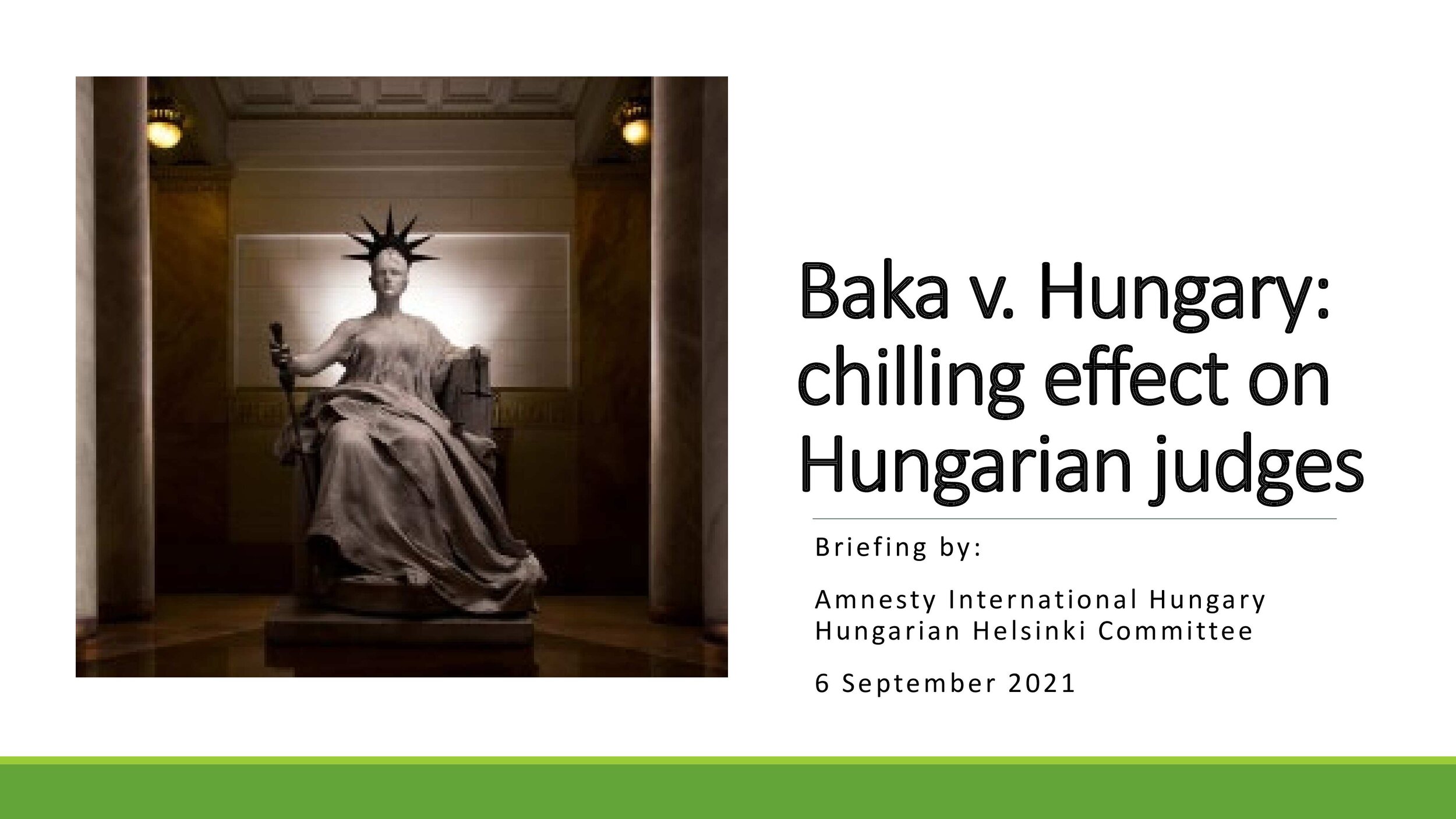
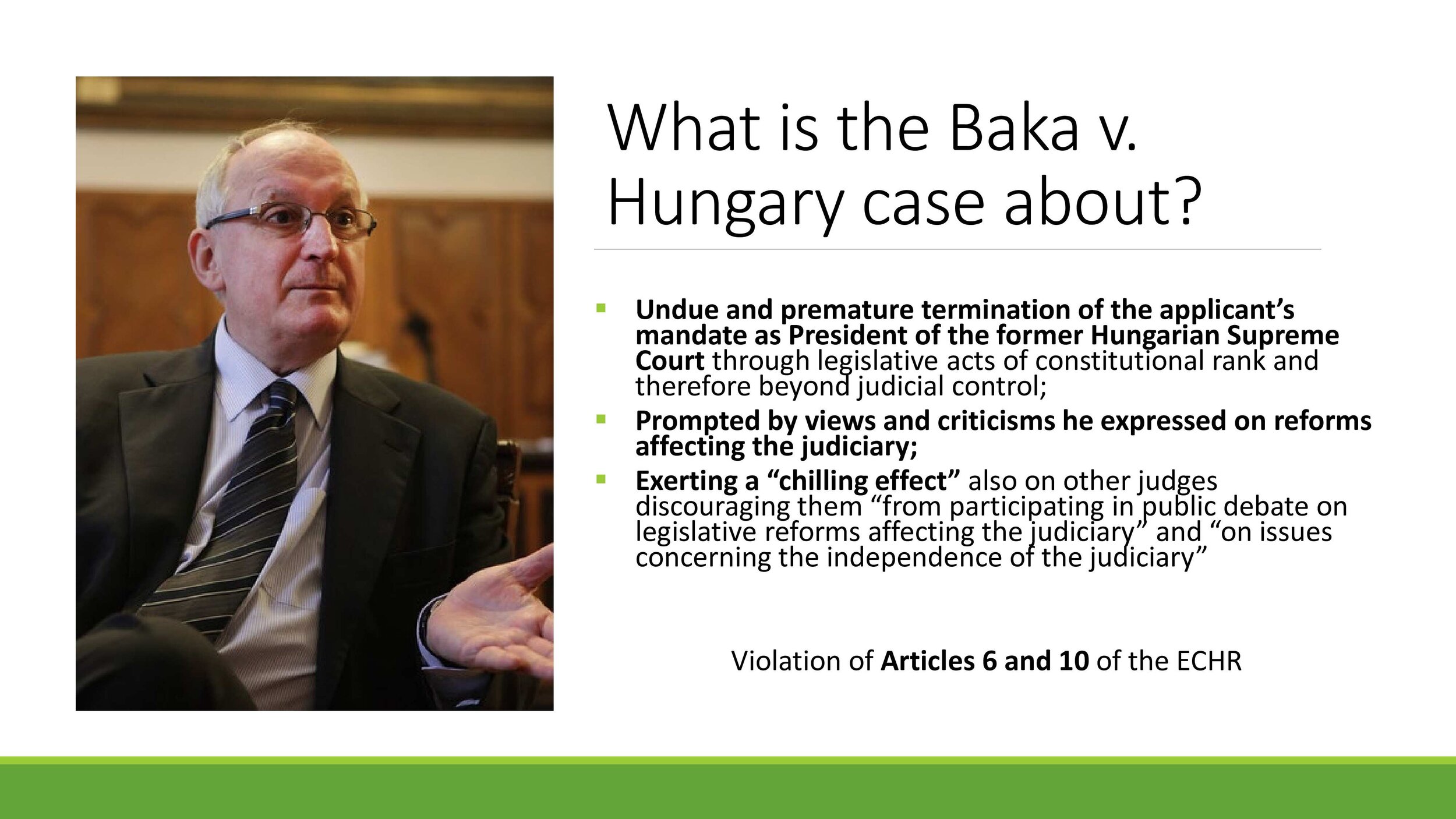
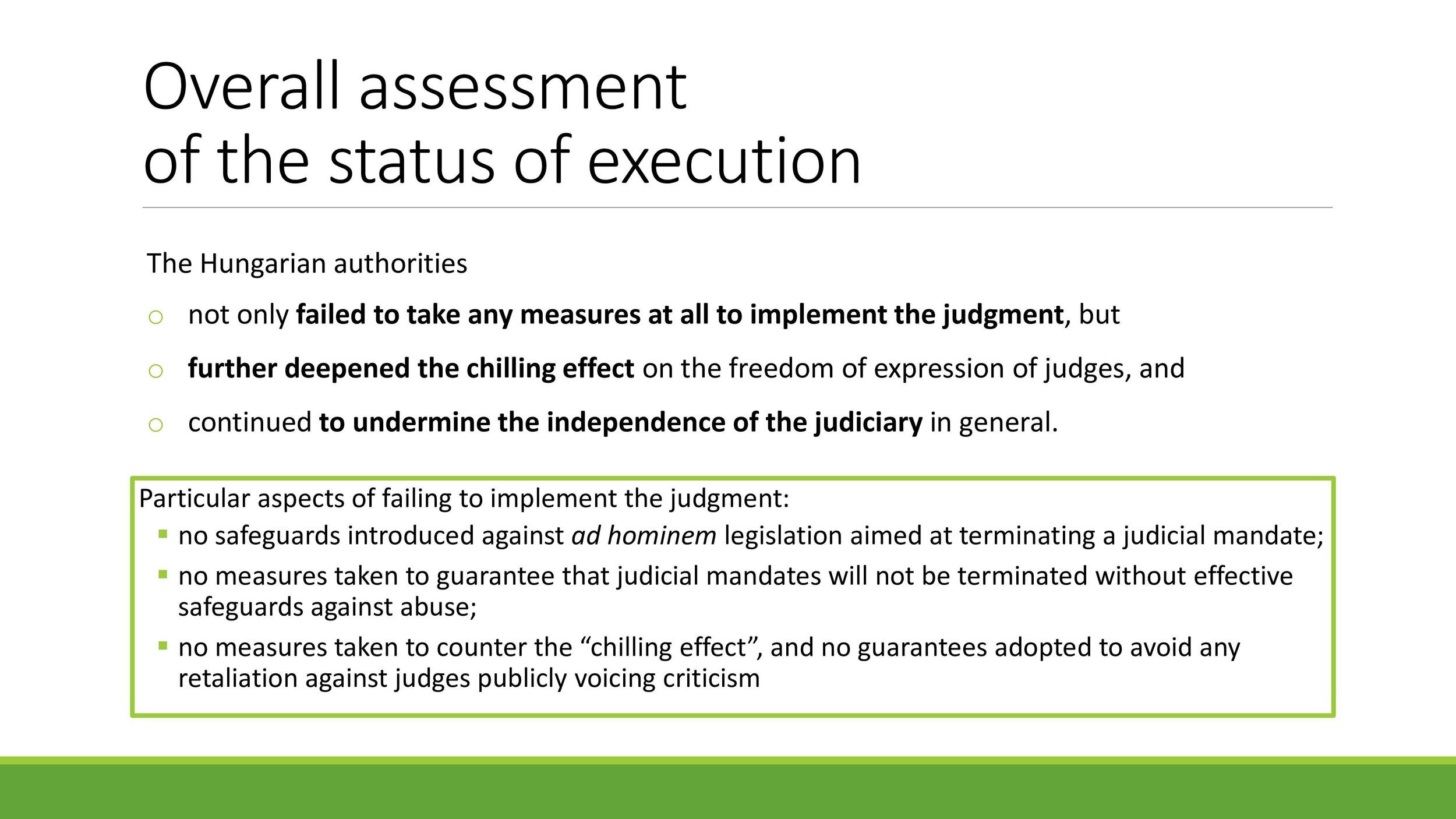
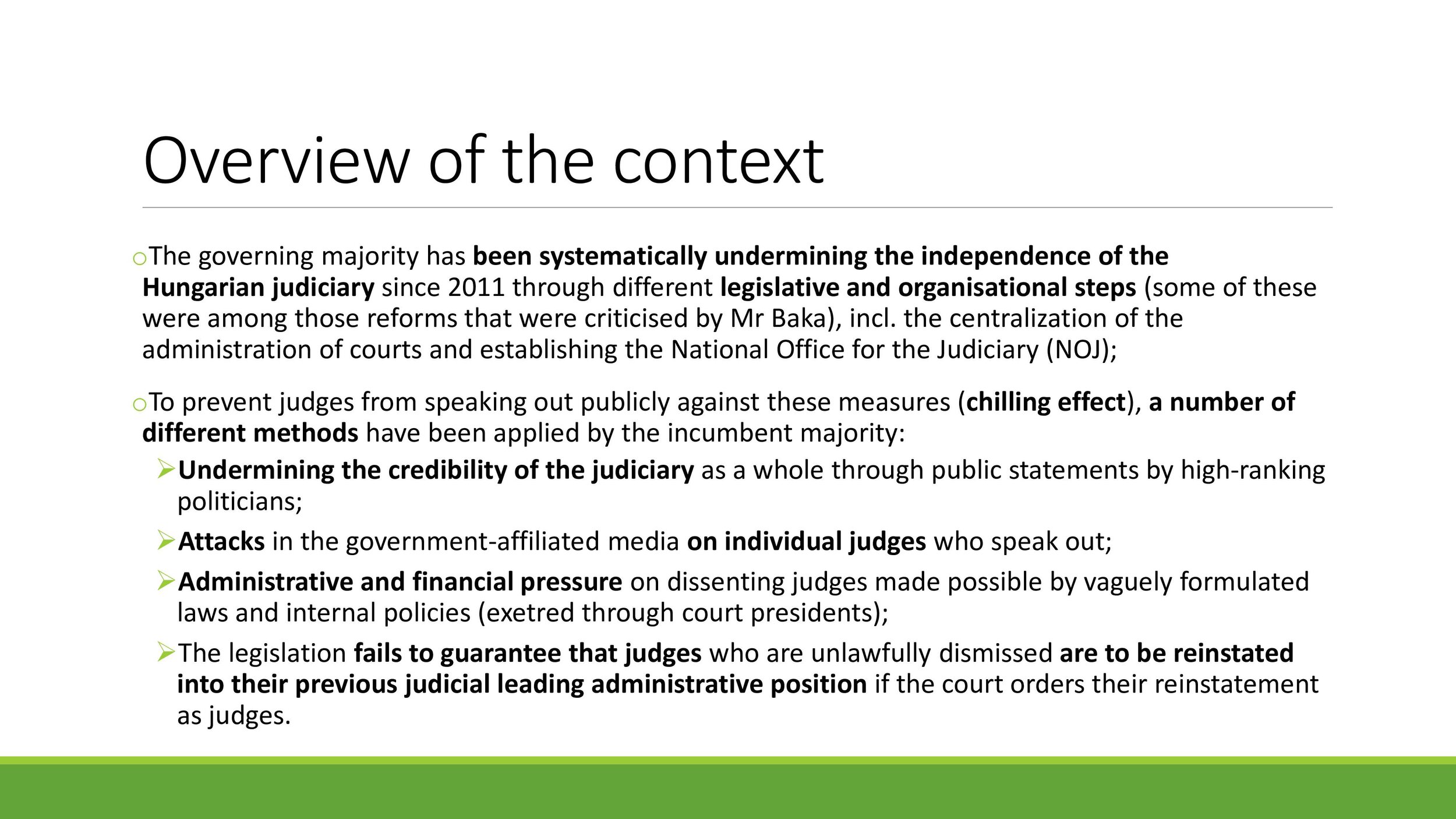
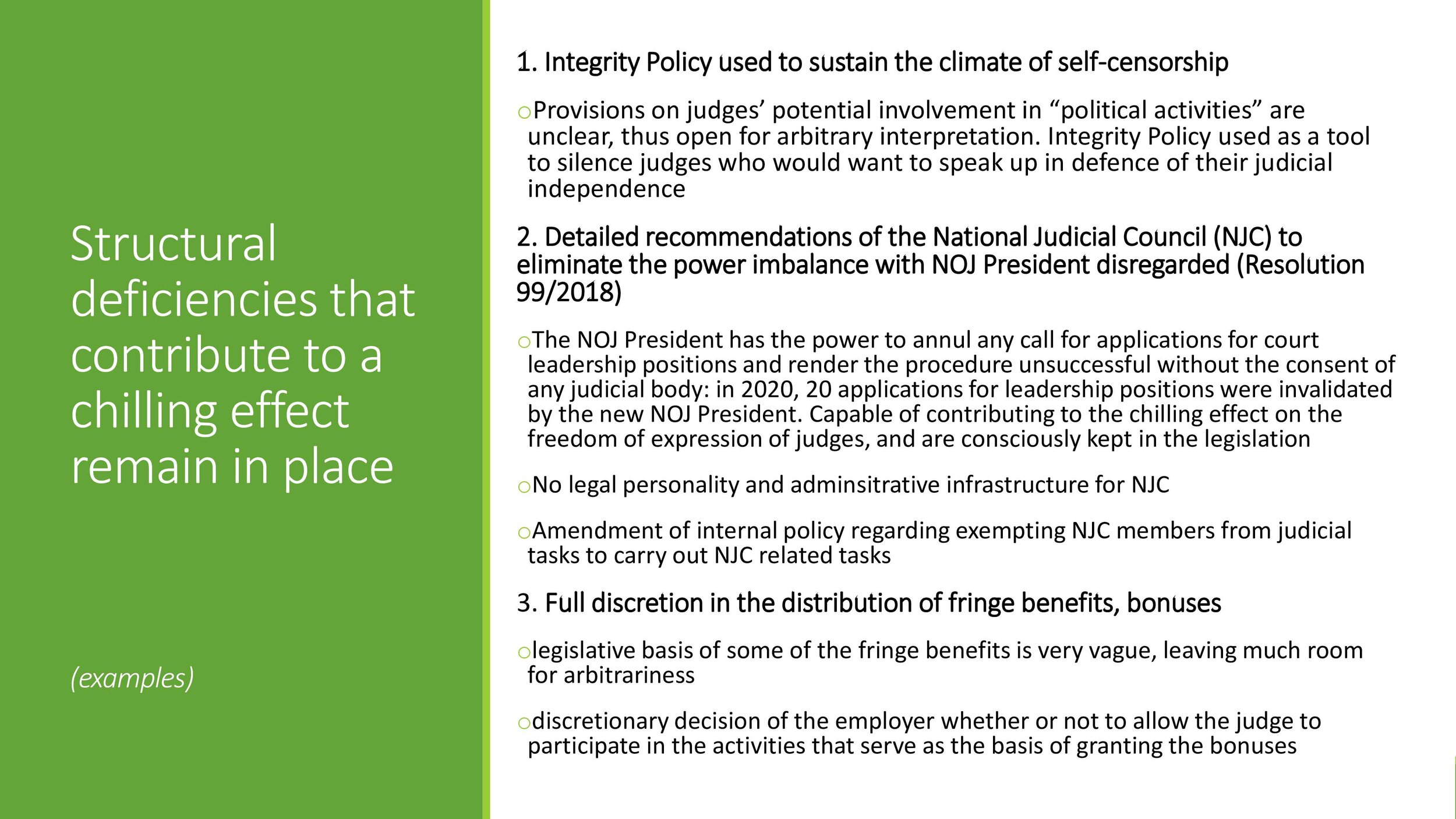
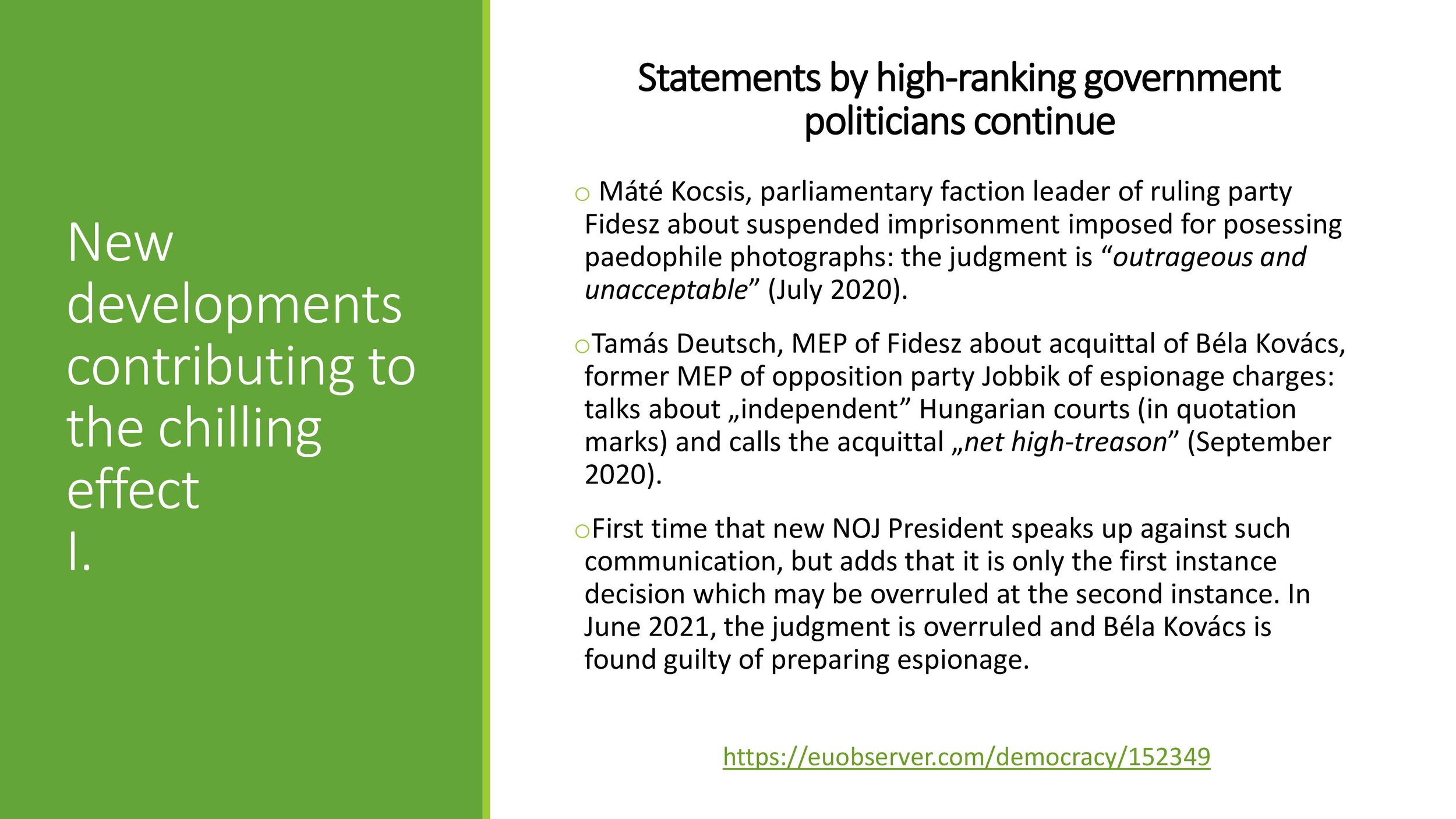
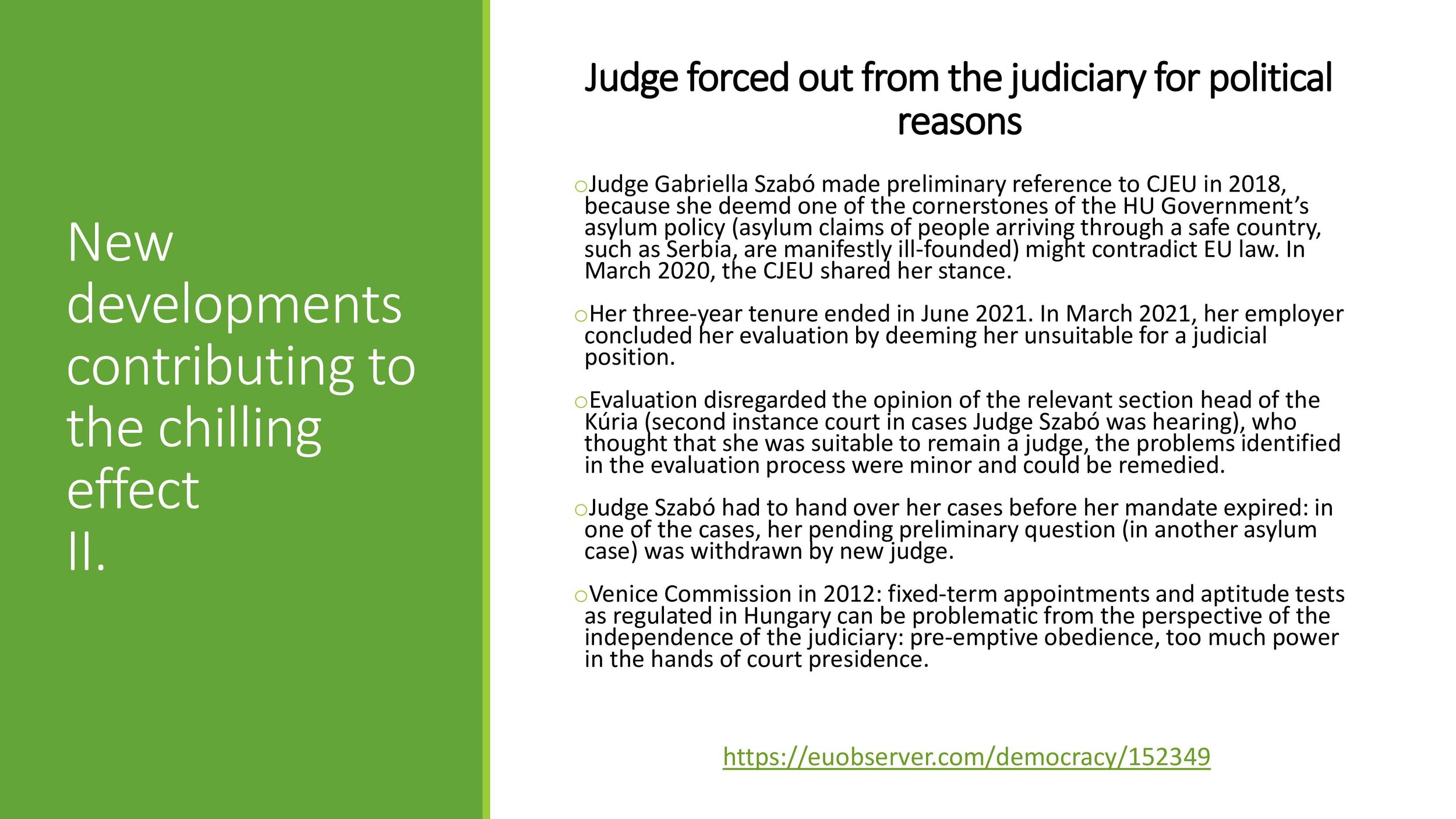
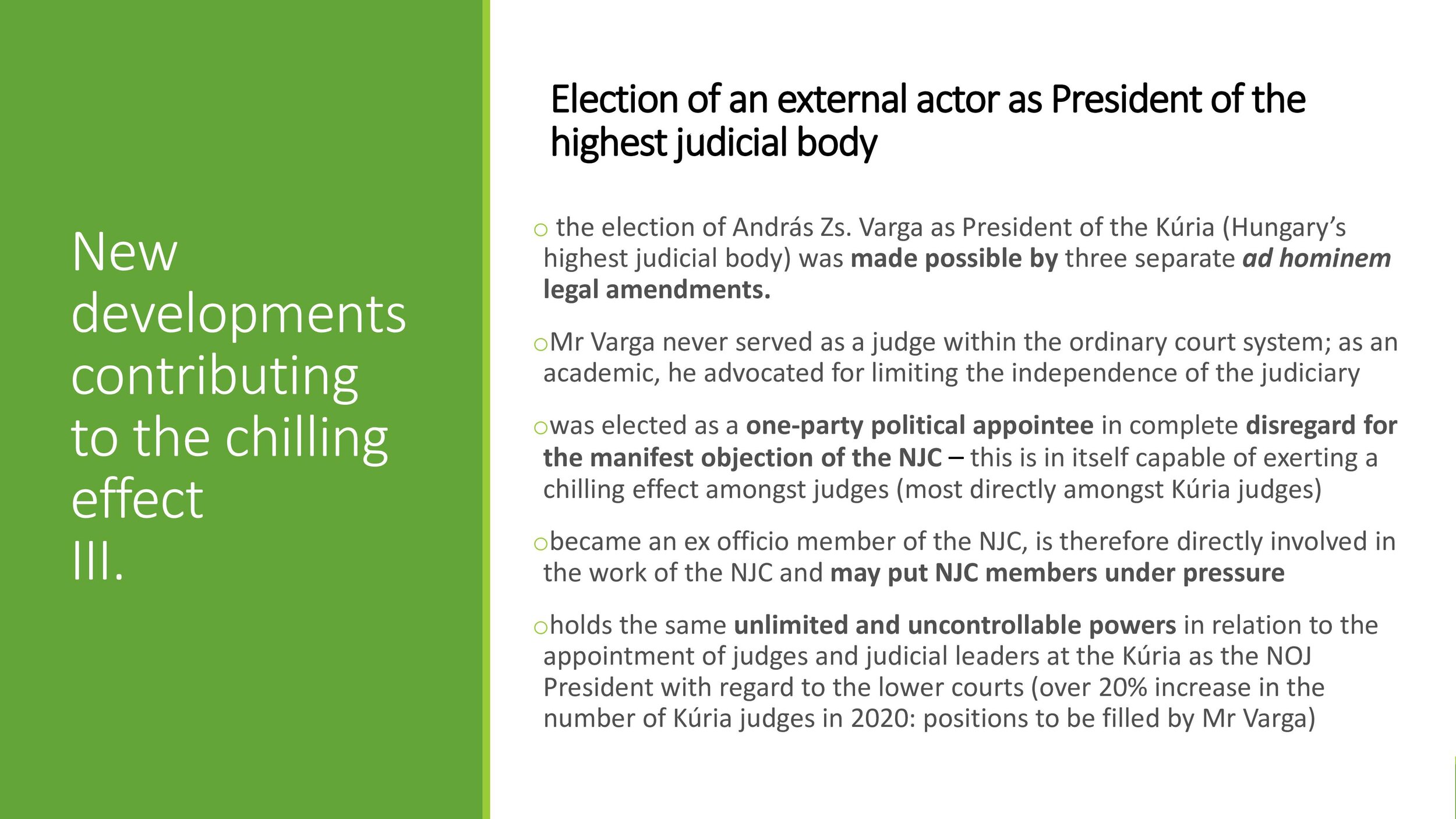
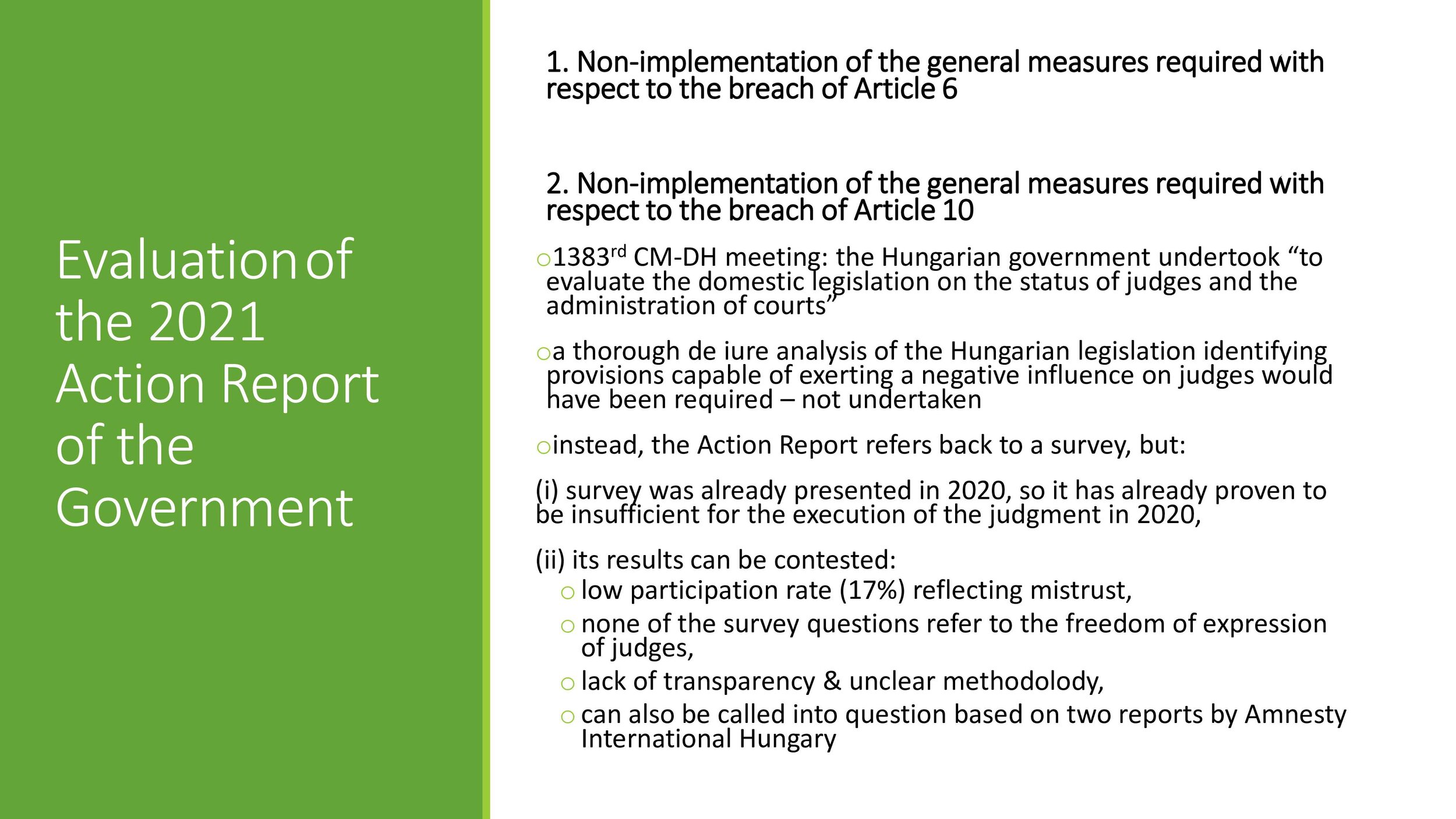
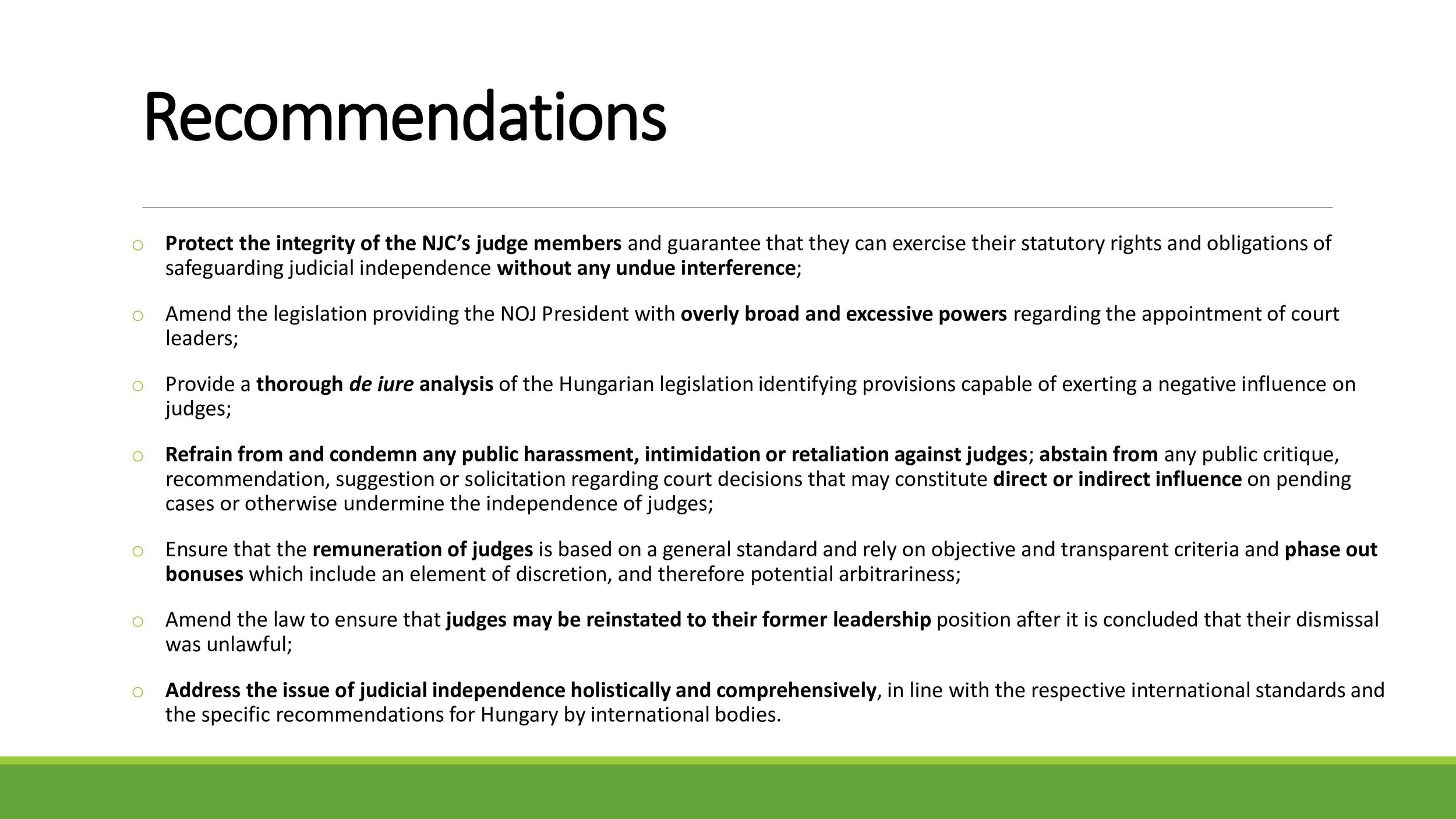
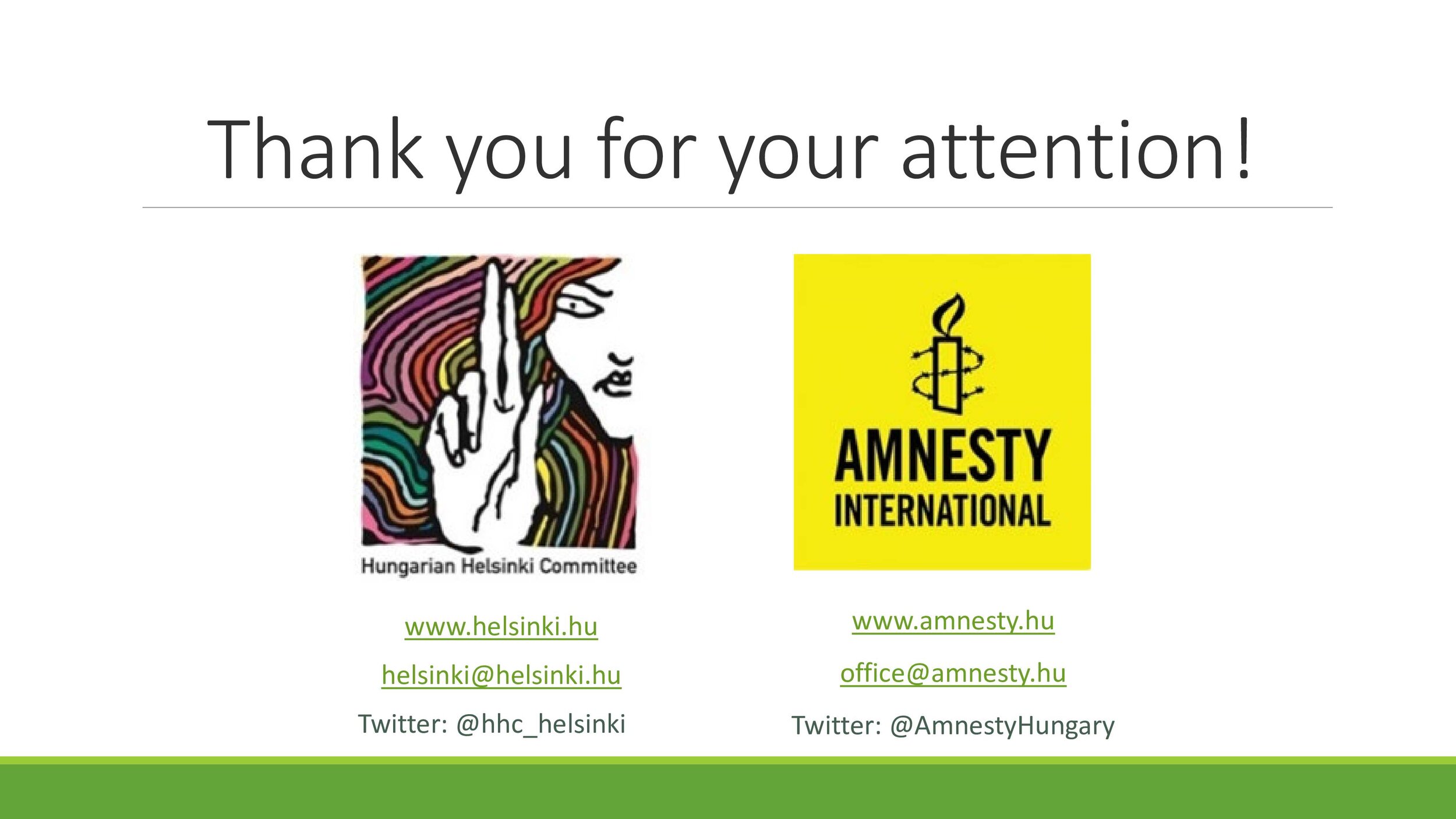
This case concerns the undue and premature termination of the applicants’ mandates as President (Baka) of the former Hungarian Supreme Court through legislative acts of constitutional rank and therefore beyond judicial control, prompted by views and criticisms he expressed on reforms affecting the judiciary and exerting a “chilling effect.” The European Court of Human Rights found a violation of Articles 6 and 10 of the European Convention on Human Rights.
The Hungarian Helsinki Committee and Amnesty International Hungary reminded the participants of the areas that the Hungarian authorities have not fulfilled the implementation of the case:
not only failed to take any measures at all to implement the judgment, but
further deepened the chilling effect on the freedom of expression of judges, and
continued to undermine the independence of the judiciary in general.
The structural deficiencies that contribute to a chilling effect remain in place:
The Integrity policy is used to sustain a climate of self-censorship
Detailed recommendations of the National Judicial Council (NJC) to eliminate the power imbalance with NOJ President are disregarded (Resolution 99/2018)
The NOJ President and judicial leaders have full discretion in the distribution of fringe benefits and bonuses
Recent developments of examples of the chilling effect in Hungary:
Statements by high-ranking government politicians continue.
Máté Kocsis, parliamentary faction leader of ruling party Fidesz about suspended imprisonment imposed for possession of child pornography photographs: the judgment is “outrageous and unacceptable” (July 2020).
Tamás Deutsch, MEP of Fidesz about the acquittal of Béla Kovács, former MEP of opposition party Jobbik of espionage charges: talks about „independent” Hungarian courts (in quotation marks) and calls the acquittal„ net high-treason” (September 2020).
The new NOJ President speaks up against such communication, but he adds that it is only the first instance decision that may be overruled by the second instance. In June 2021, the judgment is overruled and Béla Kovács is found guilty of preparing espionage.
A Judge was forced out of the judiciary for political reasons.
Judge Gabriella Szabó referred to CJEU in 2018, as she deemed one of the cornerstones of the Hungarian government’s asylum policy might contradict EU Law. Her three-year tenure ended in June 2021. Her employer deemed her unsuitable for a judicial position.
Election of an external actor as President of the highest judicial body.
The election of András Zs. Varga, as President of the Kúria (Hungary’s highest judicial body), was made possible by three separate ad hominem legal amendments. Mr Varga was elected as a one-party political appointee in complete disregard for the manifest objection of the NJC and holds the same unlimited and uncontrollable powers concerning the appointment of judges and judicial leaders.
Hungarian Helsinki Committee and Amnesty International Hungary Recommendations to the Committee of Ministers:
Protect the integrity of the NJC’s judge members and guarantee that they can exercise their statutory rights and obligations of safeguarding judicial independence without any undue interference;
Amend the legislation providing the NOJ President with overly broad and excessive powers regarding the appointment of court leaders;
Provide a thorough de iure analysis of the Hungarian legislation identifying provisions capable of exerting a negative influence on judges;
Refrain from and condemn any public harassment, intimidation or retaliation against judges; abstain from any public critique, recommendation, suggestion or solicitation regarding court decisions that may constitute direct or indirect influence on pending cases or otherwise undermine the independence of judges;
Ensure that the remuneration of judges is based on a general standard and rely on objective and transparent criteria and phase out bonuses which include an element of discretion, and therefore potential arbitrariness;
Amend the law to ensure that judges may be reinstated to their former leadership position after it is concluded that their dismissal was unlawful;
Address the issue of judicial independence holistically and comprehensively, in line with the respective international standards and the specific recommendations for Hungary by international bodies.
Please see the slides for the full Briefing.
Relevant Documents
9.2 Submissions
Selahattin Demirtas (no 2) v. Turkey & Kavala v. Turkey
Overview of Selahattin Demirtas (no.2) v Turkey
The Court found that the applicant was detained in the absence of evidence to support a reasonable suspicion he had committed an offence (violation of Article 5 §§ 1 and 3) and that his arrest and pre-trial detention especially during two crucial campaigns pursued an ulterior purpose, namely to stifle pluralism and limit freedom of political debate (violation of Article 18 taken in conjunction with Article 5); that lifting of the applicant’s parliamentary immunity and the way the criminal law was applied to penalise the applicant for political speeches were not foreseeable and prescribed by law (violation of Article 10) and that his consequent detention made it effectively impossible for the applicant to take part in the activities of the National Assembly (violation of Article 3 of Protocol No. 1).
Overview of Kavala v Turkey
The Court’s found that the applicant’s arrest and pre-trial detention took place in the absence of evidence to support a reasonable suspicion he had committed an offence (violation of Article 5 § 1 of the Convention) and pursued an ulterior purpose, namely to silence him and dissuade other human rights defenders (violation of Article 18 taken in conjunction with Article 5 § 1); and that the one year and nearly five months taken by the Constitutional Court to review his complaint was insufficiently “speedy”, given that his personal liberty was at stake (violation of Article 5 § 4).
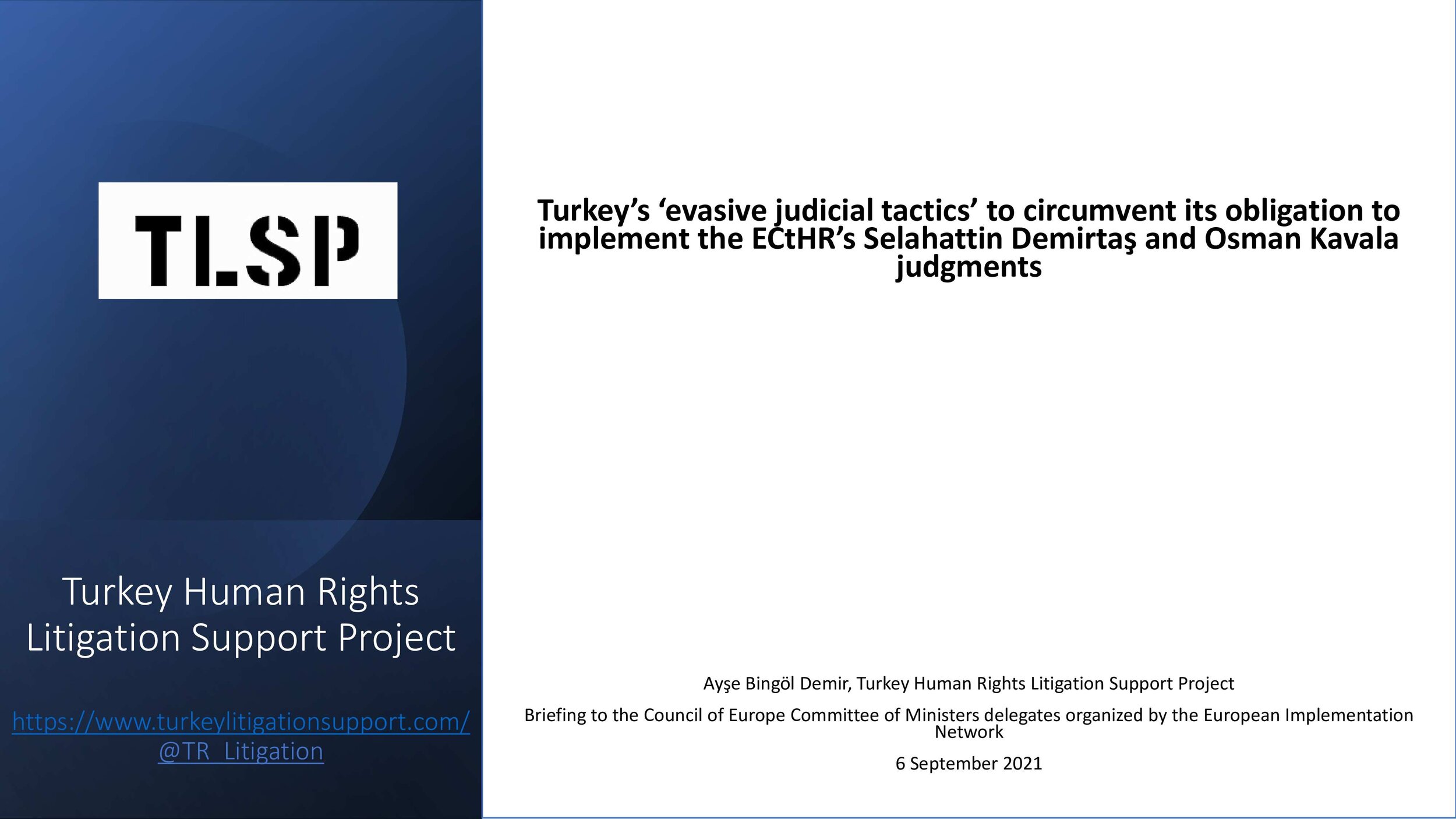
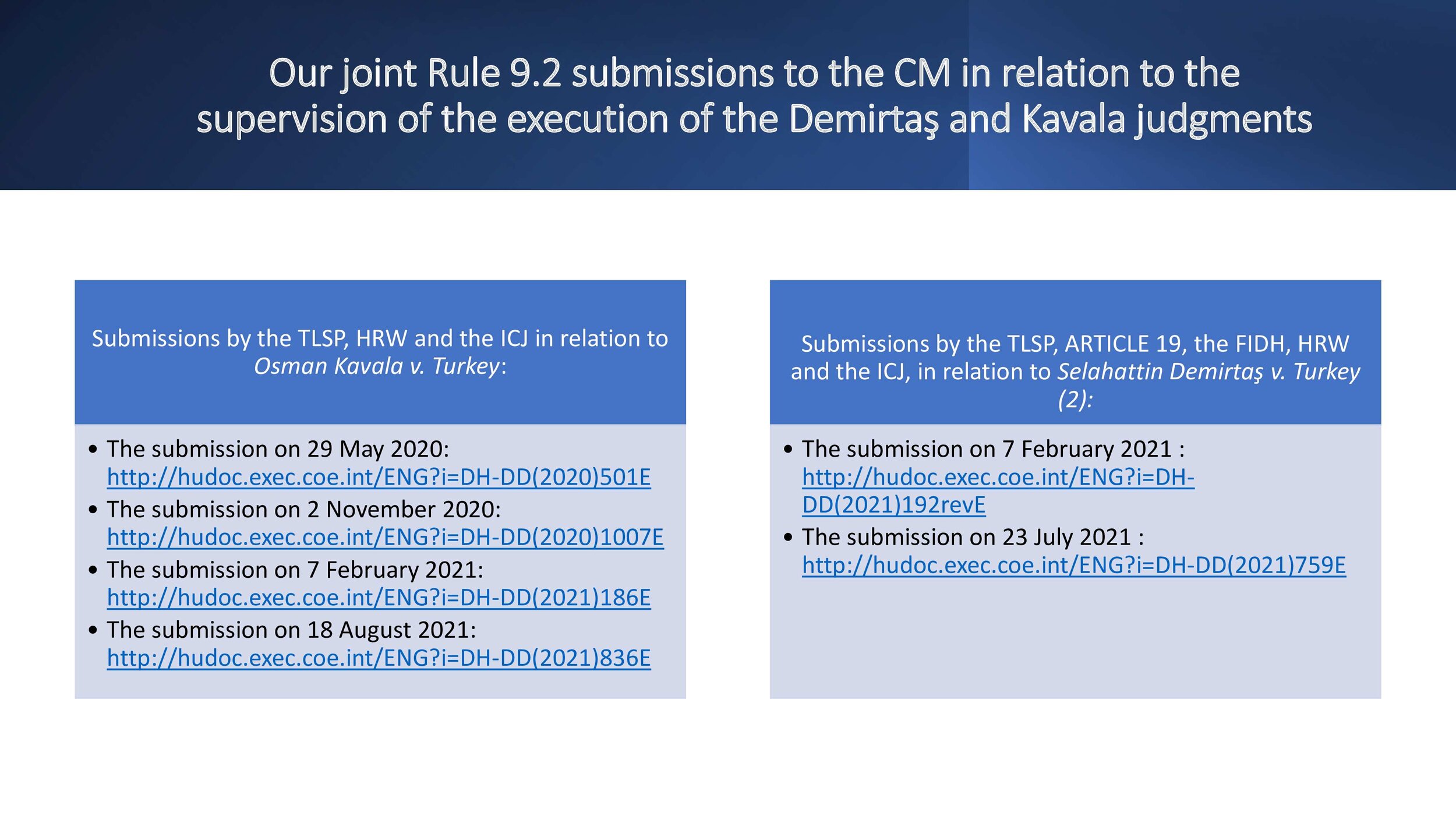
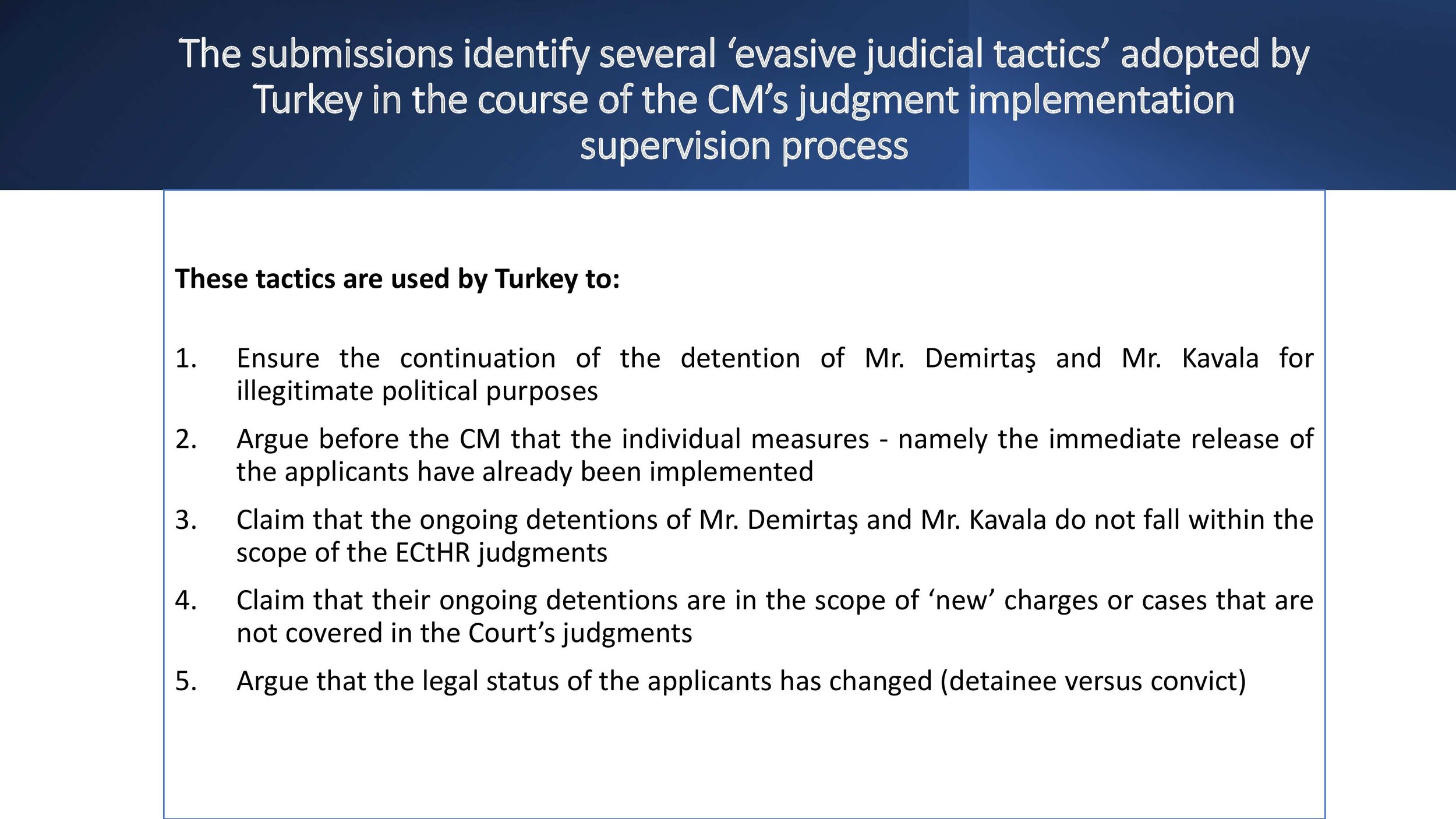
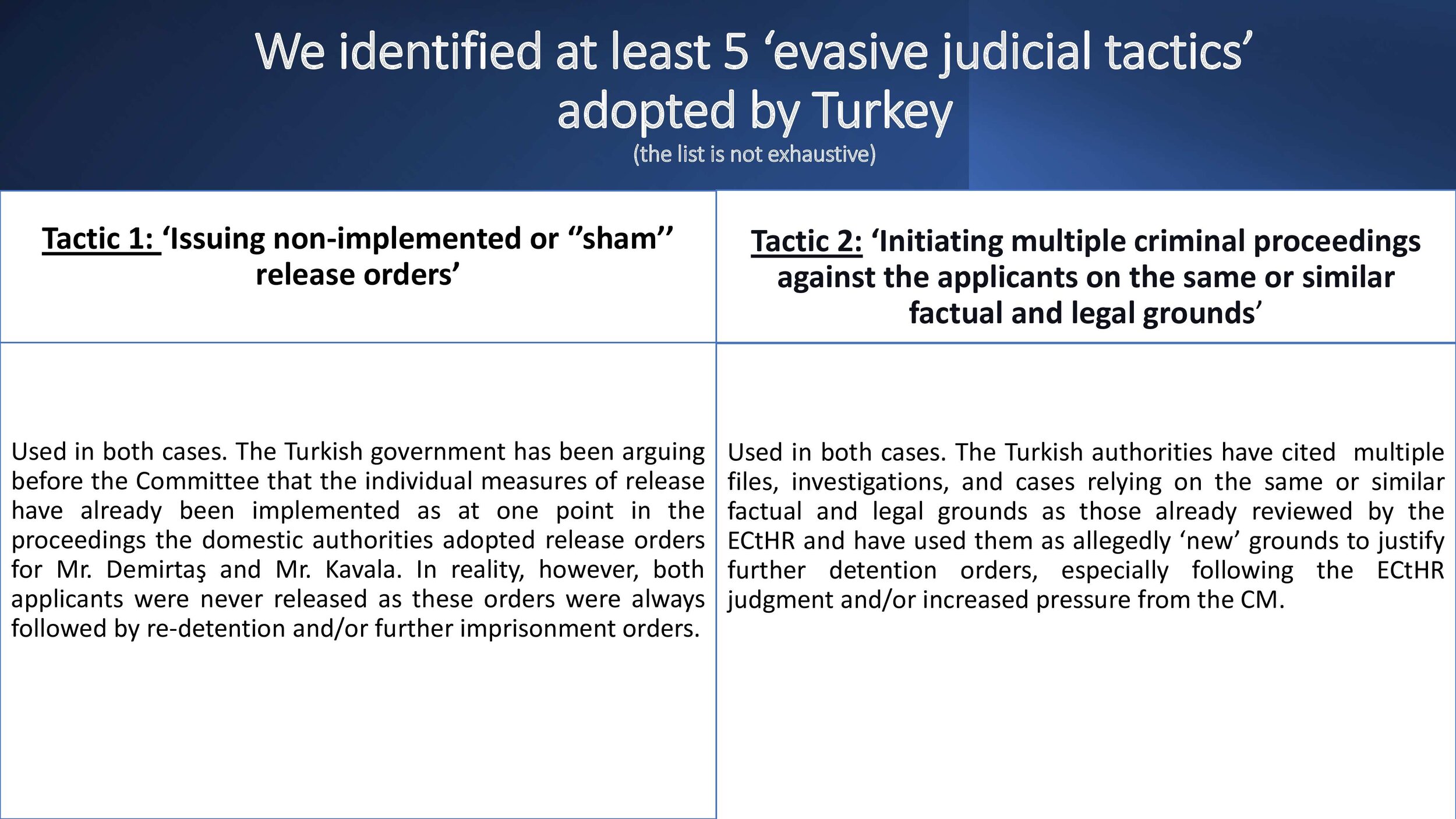
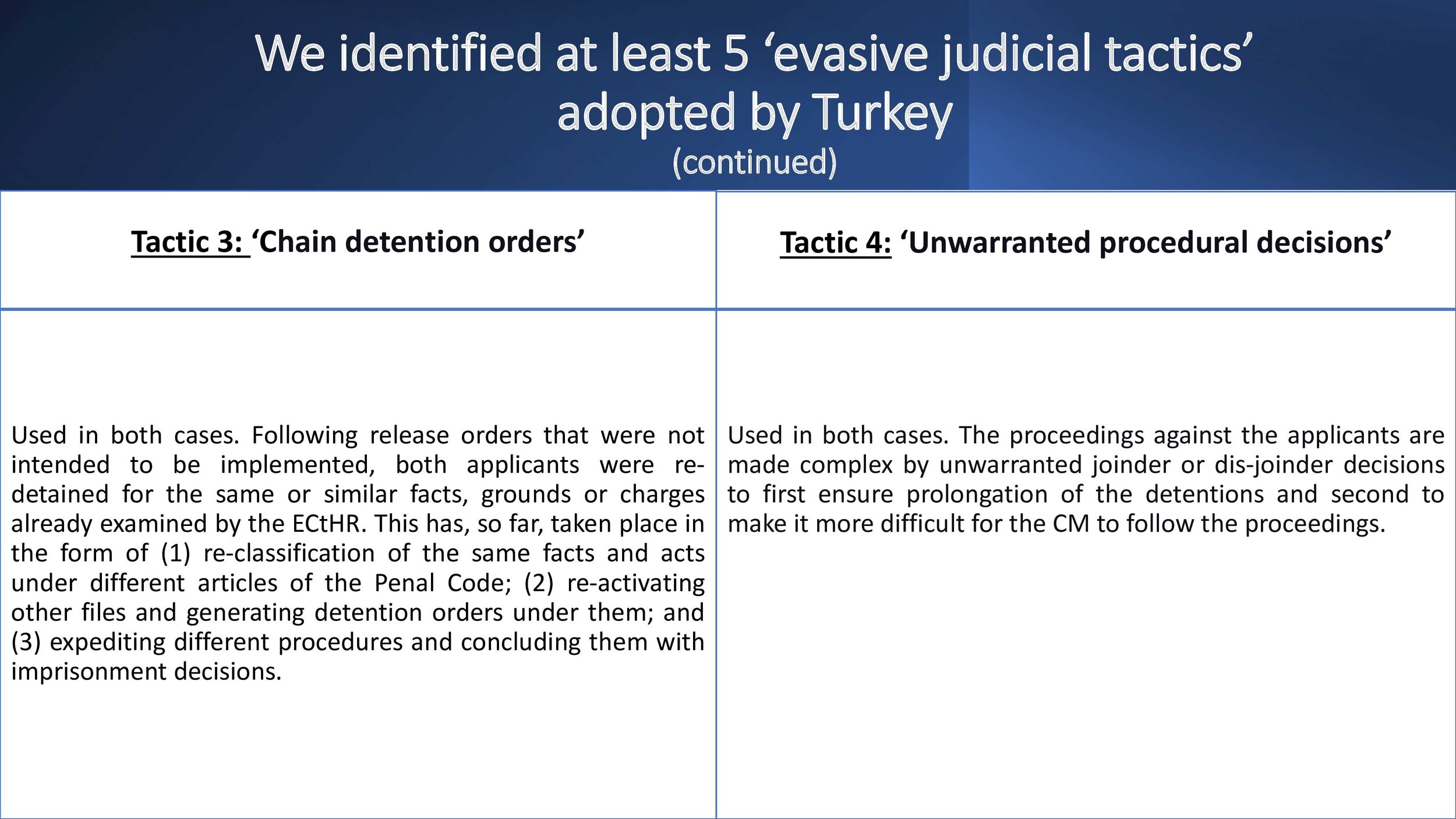
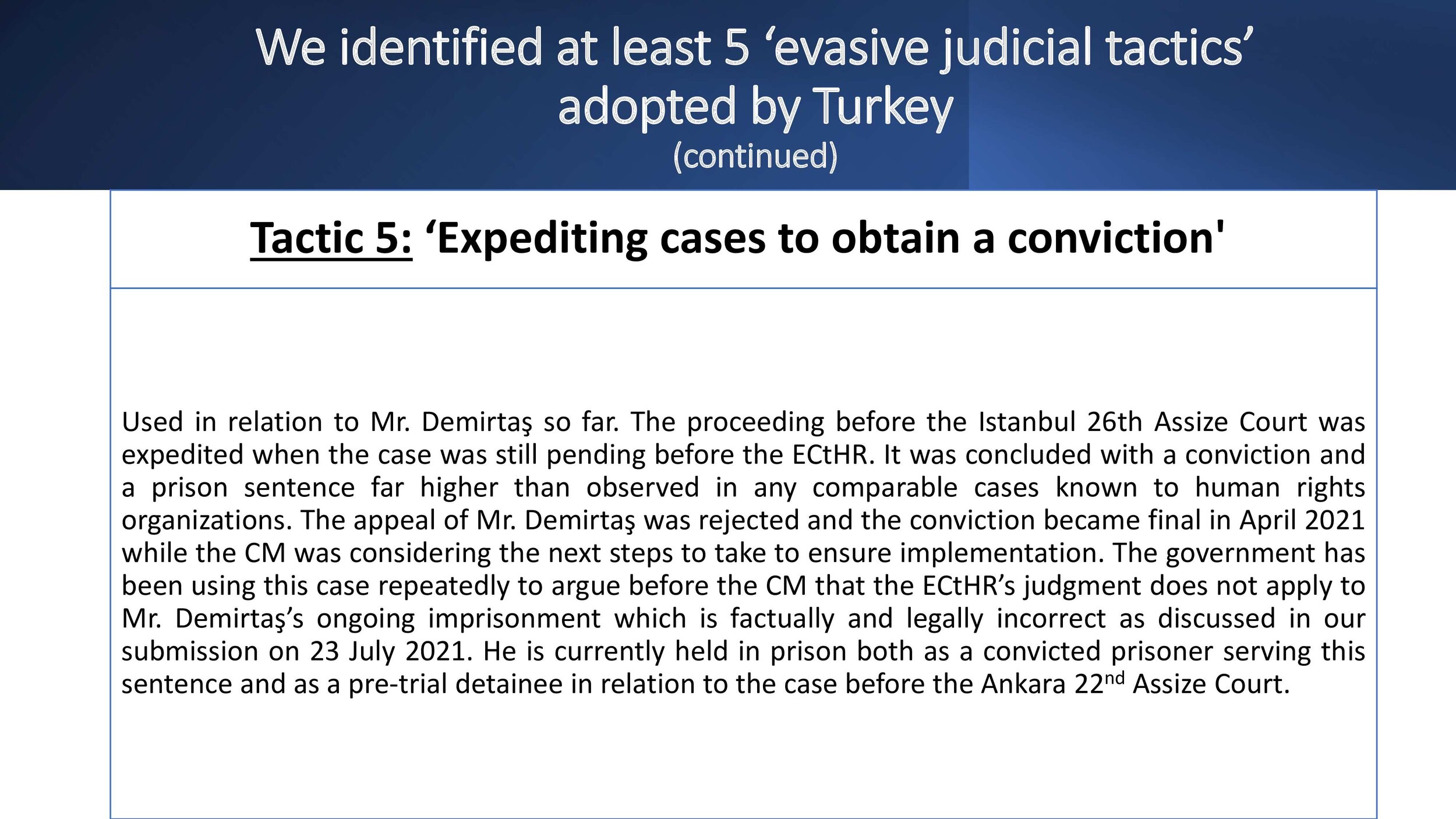
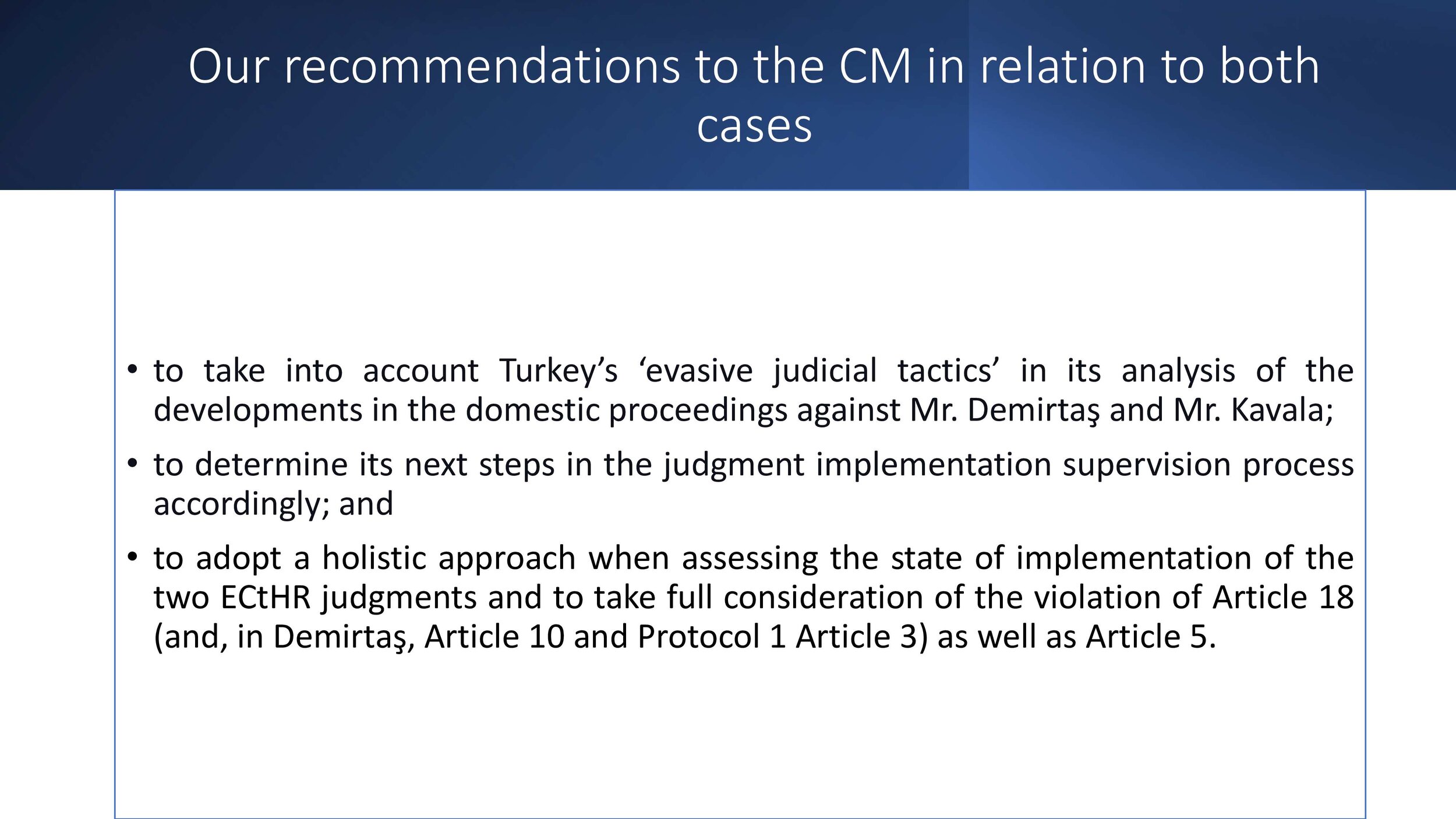
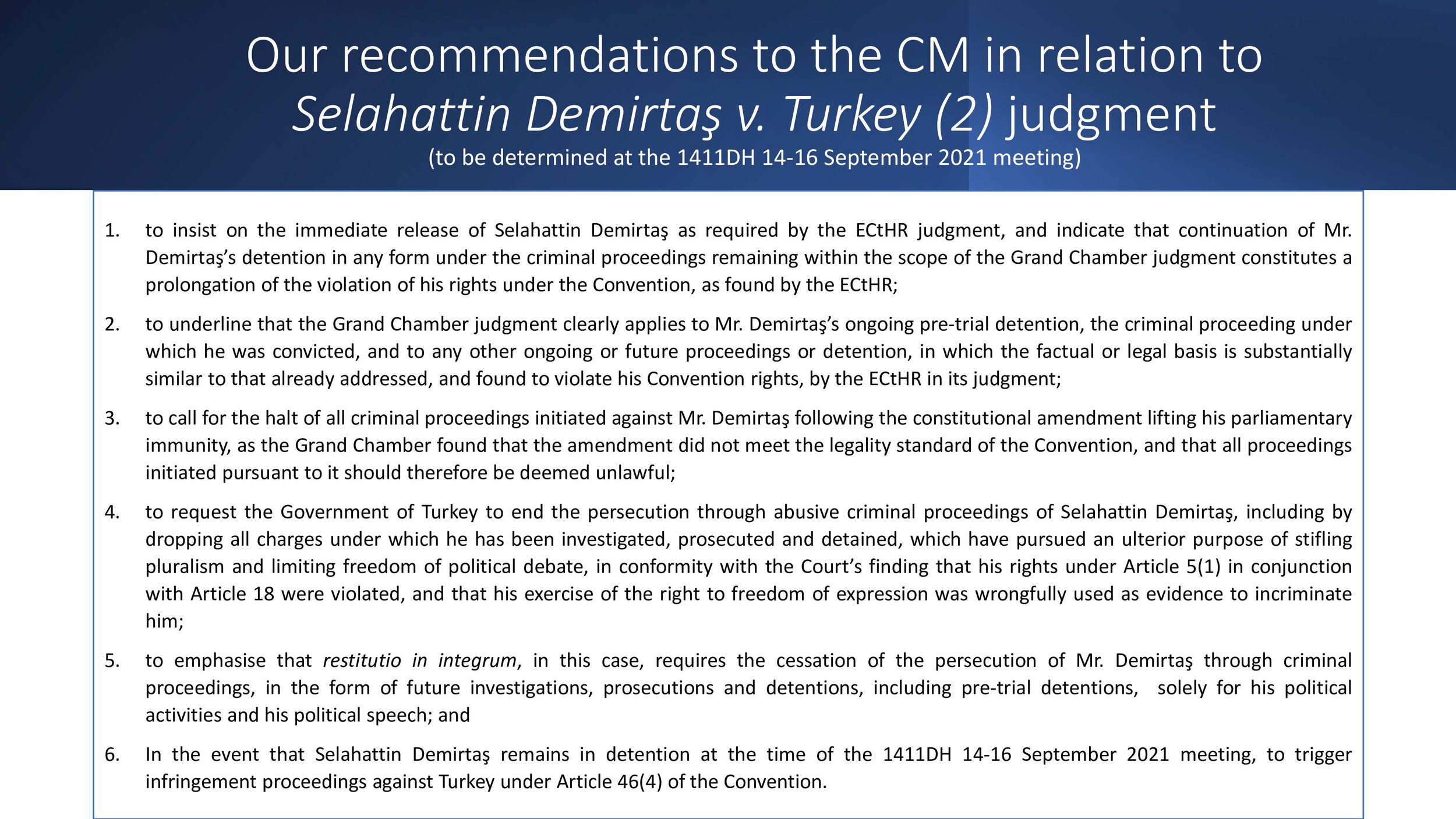
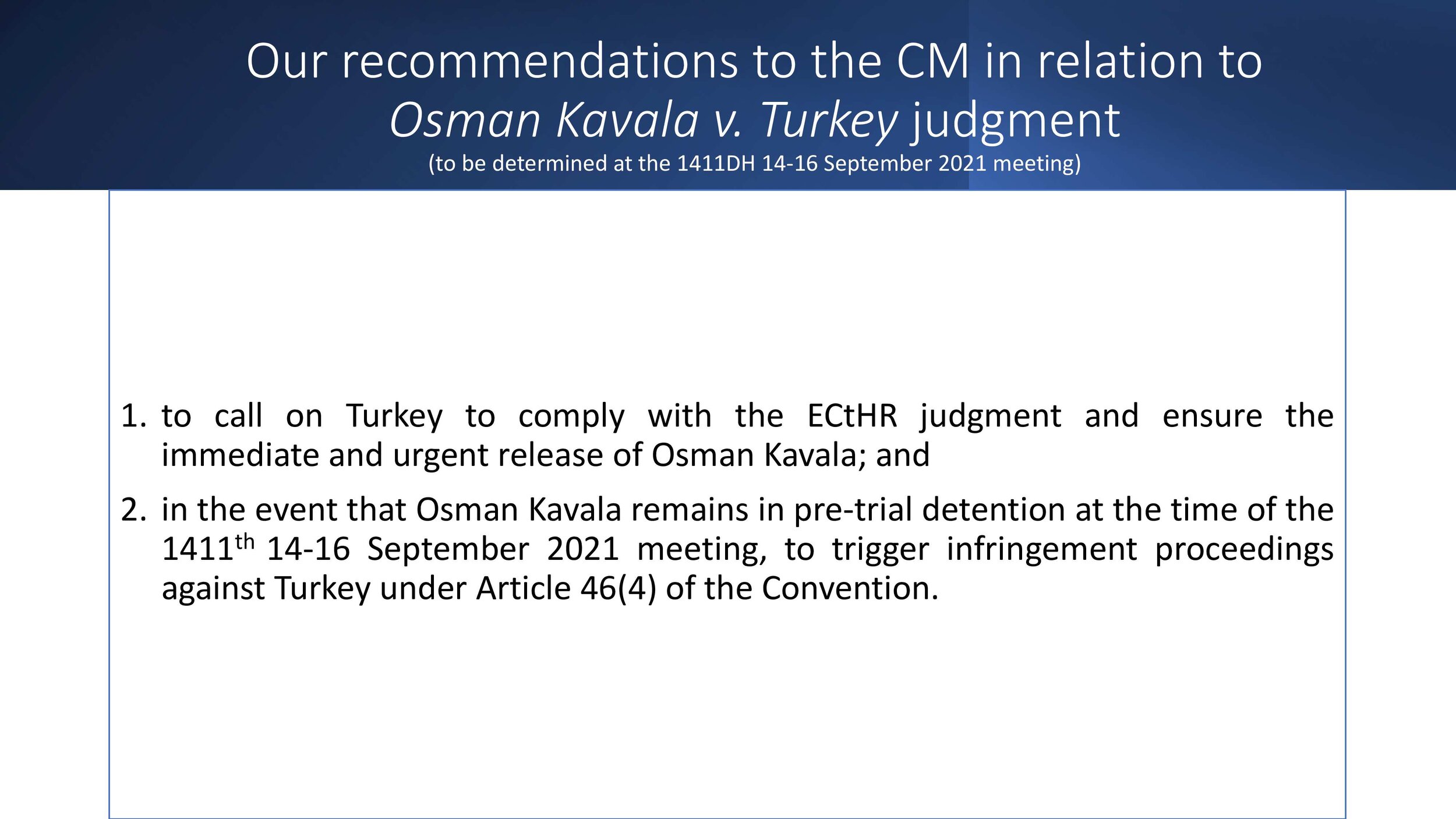

The Turkey Litigation Support Project and Human Rights Watch identified several ‘evasive judicial tactics’ adopted by Turkey to participants on the commonalities between Selahattin Demirtaş and Osman Kavala judgments. These tactics are used by Turkey to:
Ensure the continuation of the detention of Mr Demirtaş and Mr Kavala for illegitimate political purposes.
Argue before the CM that the individual measures namely the immediate release of the applicants have already been implemented.
Claim that the ongoing detentions of Mr Demirtaş and Mr Kavala do not fall within the scope of the ECtHR judgments.
Claim that their ongoing detentions are in the scope of ‘new’ charges or cases that are not covered in the Court’s judgments.
Argue that the legal status of the applicants has changed detainee versus convict).
Tactic 1: ‘Issuing non-implemented or ‘sham’ release orders’
Used in both cases. The Turkish government has been arguing before the Committee that the individual measures of release have already been implemented as at one point in the proceedings the domestic authorities adopted release orders for Mr Demirtaş and Mr Kavala. In reality, however, both applicants were never released as these orders were always followed by re-detention and/or further imprisonment orders.
Tactic 2: ‘Initiating multiple criminal proceedings against the applicants on the same or similar factual and legal grounds’
Used in both cases. The Turkish authorities have cited multiple files, investigations, and cases relying on the same or similar factual and legal grounds as those already reviewed by the ECtHR and have used them as allegedly ‘new’ grounds to justify further detention orders, especially following the ECtHR judgment and/or the increased pressure from the Committee of Ministers.
Tactic 3: ‘Chain detention orders’
Used in both cases. Following the release orders that are not intended to be implemented, both applicants were re-detained for the same or similar facts, grounds, or charges already examined by the ECtHR. This has, so far, taken the form of (1) re-classification of the same facts and acts under different articles of the Penal Code; (2) re-activating other files and generating detention orders under them; and (3) expediting different procedures and concluding them with imprisonment decisions.
Tactic 4: ‘Unwarranted procedural decisions’
Used in both cases. The proceedings against the applicants are made complex by unwarranted joinder or dis-joinder decisions to first ensure prolongation of the detentions and second to make it more difficult for the Committee of Ministers to follow the proceedings.
Tactic 5: ‘Expediting cases to obtain a conviction'
Used in relation to Mr Demirtaş, so far The proceeding before the Istanbul 26th Assize Court was expedited when the case was still pending before the ECtHR. It was concluded with a conviction and a prison sentence far higher than observed in any comparable cases known to human rights organizations. The appeal of Mr Demirtaş was rejected and the conviction became final in April 2021 while the CM was considering the next steps to take to ensure implementation. The government has been using this case repeatedly to argue before the CM that the ECtHR’s judgment does not apply to Mr Demirtaş’s ongoing imprisonment which is factually and legally incorrect as discussed in our submission on 23 July 2021. He is currently held in prison both as a convicted prisoner serving this sentence and as a pre-trial detainee in relation to the case before the Ankara 22nd Assize Court.
Turkey Litigation Support Project and Human Rights Watch Recommendations to the CM:
to take into account Turkey’s ‘evasive judicial tactics’ in its analysis of the developments in the domestic proceedings against Mr. Demirtaş and Mr. Kavala;
to determine its next steps in the judgment implementation supervision process accordingly; and
to adopt a holistic approach when assessing the state of implementation of the two ECtHR judgments and to take full consideration of the violation of Article 18
(in Demirtaş Article 10 and Protocol 1 Article 3) as well as Article 5.
Recommendations to the CM in relation to Selahattin Demirtaş v. Turkey (2) judgment:
To insist on the immediate release of Selahattin Demirtaş as required by the ECtHR judgment, and indicate that continuation of Mr Demirtaş’s detention in any form under the criminal proceedings remaining within the scope of the Grand Chamber judgment constitutes a prolongation of the violation of his rights under the Convention, as found by the ECtHR;
To underline that the Grand Chamber judgment clearly applies to Mr Demirtaş’s ongoing pre-trial detention, the criminal proceeding under which he was convicted, and to any other ongoing or future proceedings or detention, in which the factual or legal basis is substantially similar to that already addressed, and found to violate his Convention rights, by the ECtHR in its judgment;
To call for the halt of all criminal proceedings initiated against Mr. Demirtaş following the constitutional amendment lifting his parliamentary immunity, as the Grand Chamber found that the amendment did not meet the legality standard of the Convention, and that all proceedings initiated pursuant to it should therefore be deemed unlawful;
To request the Government of Turkey to end the persecution through abusive criminal proceedings of Selahattin Demirtaş including by dropping all charges under which he has been investigated, prosecuted and detained, which have pursued an ulterior purpose of stifling pluralism and limiting freedom of political debate, in conformity with the Court’s finding that his rights under Article 5(1 ) in conjunction with Article 18 were violated, and that his exercise of the right to freedom of expression was wrongfully used as evidence to incriminate him;
To emphasise that restitutio in integrum in this case, requires the cessation of the persecution of Mr Demirtaş through criminal proceedings, in the form of future investigations, prosecutions and detentions, including pre-trial detentions, solely for his political activities and his political speech; and
In the event that Selahattin Demirtaş remains in detention at the time of the 1411 DH 14 16 September 2021 meeting, to trigger infringement proceedings against Turkey under Article 46 (4) of the Convention.
Recommendations to the CM in relation to Osman Kavala v. Turkey judgment:
Call on Turkey to comply with the ECtHR judgment and ensure the immediate and urgent release of Osman Kavala; and
In the event that Osman Kavala remains in pre-trial detention at the time of the 1411th 16-18 September 2021 meeting, trigger infringement proceedings against Turkey under Article 46(4) of the Convention.
Please see the slides for the full Briefing.
Relevant Documents for Selahattin Demirtas (no.2) v Turkey
9.1 Submissions
CM Decisions
9.2 Submissions
Relevant Documents for Kavala v Turkey
Rule 9.2 Submissions
Rule 9.1 Submissions
CM Decisions
The Oao Neftyanaya Kompaniya “Yukos” v Russian federation Case
Overview of the “Yukos” Case
The case concerns different violations concerning tax and enforcement proceedings brought against the applicant oil company, leading to its liquidation in 2007, namely:
Insufficient time allowed for the preparation of its defence at first instance and on appeal during the 2000 tax-assessment proceedings (violation of Article 6 § 1, taken in conjunction with Article 6 § 3(b));
Unforeseeable imposition of penalties in the 2000-2001 tax assessments on account of the retroactive application of a subsequent Constitutional Court decision of 2005 defining in a new way the time-limit for liability for tax offences (violation of Article 1 of Protocol No. 1);
Failure to strike a fair balance in the enforcement proceedings between the legitimate aim pursued and the measures employed (violation of Article 1 of Protocol No. 1):
No global assessment of the consequences of the chosen enforcement actions for the applicant company;
Imposition of a fixed 7% enforcement fee completely out of proportion with the expenses incurred;
Unyielding inflexibility as to the pace of the enforcement actions.
Piers Garden, legal counsel of the injured parties and barrister at Monckton Chambers, reminded participants of the Russian authorities action plan of 2013 and voiced with regret that authorities have not taken any substantial steps to implement any of the measures advised by the Committee of Ministers.
Specifically,
That will be the eleventh time that the execution of the Yukos judgment has been examined by the CM-DH in the six and a half years since the Judgment became final.
The respondent Government have failed to fulfill their obligation under Article 46 § 1.
The amounts awarded in the judgment remain due and have been owed to the Yukos shareholders for almost 7 years.
Recent developments
On August 31, 2021, Russian Authorities submitted an Action Report to the CM, though it does not reply to any of the CM-DH's questions. It does not report any action taken to execute or comply with the Judgment.
Recommendations
The CM-DH should resolve to list the Yukos case on the agenda of each of its forthcoming meetings until its questions are answered and the judgment is complied with.
Relevant Information
Rule 9.1 Submission
Rule 9.1 Communication from the applicants’ representative (01/06/2016) in the case of OAO Neftyanaya Kompaniya YUKOS against Russian Federation (Application No. 14902/04)
Rule 9.1 Communication from the applicant's representative (25/02/2016) in the case of OAO Neftyanaya Kompaniya Yukos against Russian Federation (Application No. 14902/04)

